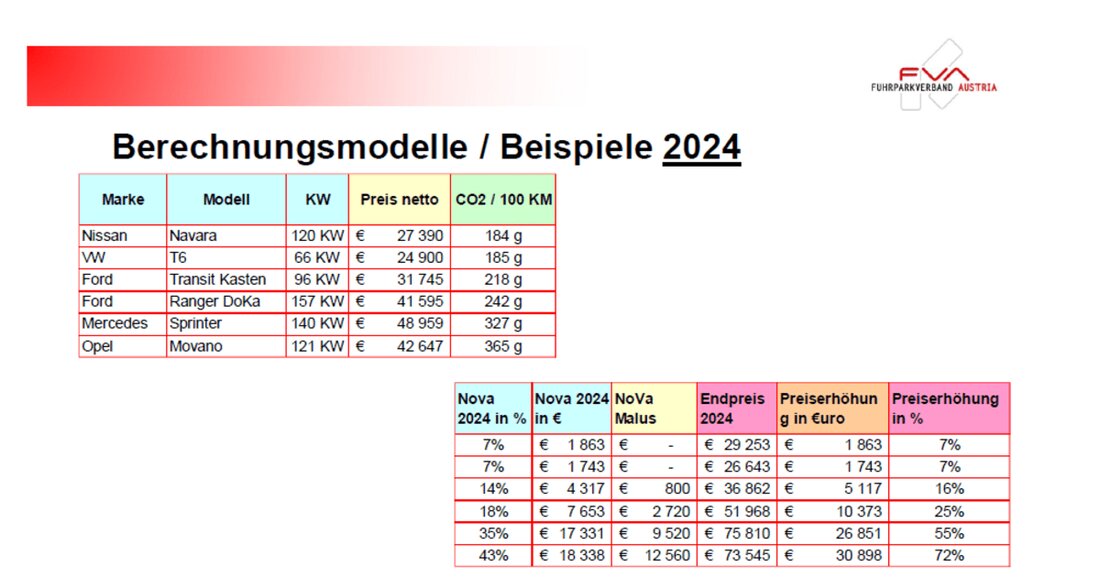NoVA: Fleet association mobilizes against tax club
Hope dies last. Under this motto, the fleet association appeals to the government's common sense and hopes that it will change its NoVA plans after all.

NoVA: Fleet association mobilizes against tax club
Can the new NoVA for commercial vehicles still be prevented? Under this motto, the Austrian Fleet Association (FVA) organized an information event for its members - which was of course held online. The stakeholders once again made it very clear what they think of the government's NoVA plans - namely nothing! "I would like to emphasize that we are also in favor of reducing pollutant emissions. But that is simply not the right way," says FVA chairman Henning Heise. He absolutely wants to overturn the changes decided by the government (the NoVA for light commercial vehicles is due to be introduced in July 2021) and replace them with “more sensible measures”.
Higher mineral oil tax as an alternative
The association itself is available to develop appropriate concepts: “We have a lot of expertise and would like to get involved,” says Heise, who would like to present his concerns to Federal Minister Leonore Gewessler. Instead of vehicle taxes, Heise would find significantly higher mineral oil taxes more sensible, especially since they depend on the mileage. The NoVA for light commercial vehicles is downright counterproductive: "I don't see how the goal of decarbonization can be achieved with this. That doesn't get us any further, on the contrary: it would actually do more harm than good," says Heise.
The stakeholders have a tool in their hands that provides them with arguments. And this is getting stronger and stronger: The fleet association started a survey in December, in which representatives from more than 170 companies have already taken part, which in turn have more than 40,000 vehicles in operation in Summer. The aim is to explore the effects of the planned NoVA increase on the company's fleet. This shows that 99.2 percent of the companies surveyed will use their existing vehicles for longer given the higher costs for new vehicles. “This means that older vehicles with higher emissions will stay on the road longer,” says FVA chairman Heise. The opposite effect, which is better for the environment, occurs in Germany, where vehicles are much cheaper and, according to Heise, are actually driven for less time in the fleets, i.e. have a lower average age and are therefore more environmentally friendly.
SMEs and consumers suffer
Other results of the FVA survey also speak against a NoVA for commercial vehicles: Two thirds of companies are already forced to pass on the higher acquisition costs resulting from the increased NoVA to their customers. “This will not only affect companies, but ultimately all of us,” emphasizes Heise. On top of that, the timing of the tax increase in the middle of the Corona-related economic crisis was extremely unfavorable. The companies surveyed see it the same way. In addition, the NoVA cannot have any political control effect for so-called N1 vehicles. After all, there are hardly any electrically powered alternatives for many commercial vehicle applications. This results in a massive additional burden, without the possibility of accessing other vehicles without combustion engines.
Those who suffer are primarily SMEs and, ultimately, consumers too. Calculation examples from the FVA show how massive the effects would be: this year the purchase price for a Mercedes Sprinter would increase by 19,563 euros, or 40 percent, to around 68,500 euros; for the Opel Movano the price increase would be even higher. In 2024, when the maximum NoVA rate should be 80 percent according to the government plan, the Sprinter would even cost almost 76,000 euros. The Opel Movano would then see a price increase of 30,898 euros: from a current net price of 42,647 euros to an impressive 73,545 euros!
Model student Siemens
The Siemens Group proves that there is another way and, above all, without a tax wedge. Back in 2015, he announced the goal of halving his CO2 emissions by 2020 and becoming climate-neutral by 2030. The former goal was actually achieved, to which the fleet also contributed. The group operates a fleet of around 50,000 vehicles worldwide. Steffen Peschel, fleet manager at Siemens Austria and deputy chairman of the FVA, explains that reducing emissions is not just based on switching to electric vehicles, but on two other pillars that work together: a reduction in the number of vehicles overall and the use of alternative mobility.
Meanwhile, the association wants to continue mobilizing against NoVA. The planned further steps include cooperation with other associations as well as a letter to Minister Gewessler and the submission of an “application” in the form of a petition, citizens' initiative or even a referendum. “For us, the discussion has only just begun,” says FVA chairman Henning Heise combatively.

 Suche
Suche
 Mein Konto
Mein Konto